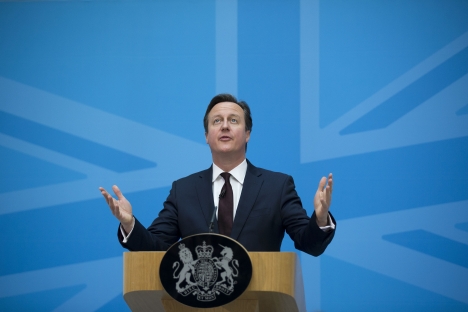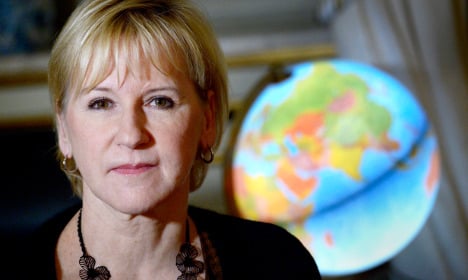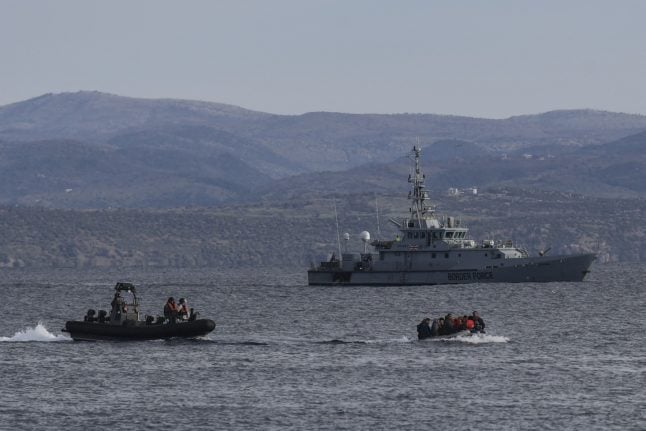Smiley, friendly and appearing to be completely relaxed, Margot Wallström apologizes in case she falls asleep halfway through the interview, explaining: “I've just taken my allergy tablets”.
Sweden's foreign minister then rushes to clear her cluttered desk.
“Look at this mess, bags and stuff. People are going to wonder what we are doing here,” she laughs.
It is a huge contrast to the well-rehearsed stage show so often performed by media-savvy politicians. Wallström does not just come across as genuine, she even seems nice. Hard to believe that this is the same minister who in March sparked one of the most public crises Sweden has experienced in recent times.
We meet just over two months after Saudi Arabia abruptly cut all diplomatic and business ties to Sweden in a much-publicized row. The media frenzy has since died down and relations between the two countries have more or less returned to normal.
“I think it's good that we're back to normal bilateral and diplomatic connections to Saudi Arabia,” says Wallström.
“What's important to think about, however, is what exactly makes the Saudi reaction so strong and why it is that even statements on democracy and human rights prompt such a strong reaction. Indeed, I actually think that this is the important analysis,” she adds.
READ ALSO: Who's who in Swedish politics?
To cut a long story short: Saudi Arabia blocked Wallström from speaking at an Arab League summit and recalled its ambassador from Stockholm in mid-March, citing critical comments she had made about human rights in the conservative kingdom. Among other things she had referred to the punishment inflicted on regime-critical blogger Raif Badawi – 10 years in jail and 1,000 lashes – as “medieval”. At around the same time, Sweden cancelled a long-standing military cooperation deal between the two countries, which in turn prompted Saudi Arabia to freeze all Swedish business visas to the Gulf nation.
Blogger Raif Badawi was flogged today in Saudi Arabia. This cruel attempt to silence modern forms of expression has to be stopped.
— Margot Wallström (@margotwallstrom) January 9, 2015
Wallström's comments were always sure to be controversial in Saudi Arabia, but what suprised many foreign spectators was the storm they ripped up in Sweden – a nation with strong focus on promoting human rights.
Suddenly the politician found herself accused of letting her feminist foreign policy ideals clash with the demands of realpolitik, with several powerful businesspeople claiming she was jeopardizing Sweden's trade relations with the Arab world.
“It's important that you stand up for what you believe in, even when it costs you,” she says.
“I think there's a double standard among many who criticized me. They say that 'yes, sure, we'll stand up for democracy and human rights, but it must not cost us anything.' And yes, one could actually wish for a clearer stance from those who at least in words say they want to support my position.”
Margot Wallström quickly tidies up her desk during the interview. Photo: Emma Löfgren/The Local
In many ways, Wallström is a career politician. Born in Skellefteå in northern Sweden in 1954, she was elected to parliament at the age of 25. The former European Union commissioner has been in charge of a number of different ministerial portfolios on home turf and also served as the first United Nations Special Representative of the Secretary-General on Sexual Violence in Conflict.
On Thursday this week she was appointed to another UN top job, as an expert on Secretary-General Ban Ki-moon's high-level expert panel on humanitarian financing.
The busy minister says the only place where she is able to find true solace is in the rural Värmland region in western Sweden where her family lives.
“I'm probably bad at the work/life balance. But I am lucky enough to be able to go home to Värmland every now and then at weekends and then it is like I enter into a completely different rhythm, where I can be completely at peace, relax and catch up with myself. But otherwise you're obviously always a minister, you're always politically responsible and you're always on duty. But I've got used to living that way,” she says.
Despite being one of the heavyweights in the Social Democrat party and one of Sweden's most popular politicians, Wallström has consistently refused to take over the top office. Her heart has always been in foreign policy, not the nitty-gritty of domestic affairs, and she says she finds the ongoing debate about the United Kingdom's coming in/out referendum on the European Union “sad”.
“Britain needs to decide for itself what it wants to do. But it is very important to the EU. And to Sweden it has been a partner nation on very many issues – everything from free trade to social issues and other things – so we would of course miss them, and it would be, I think, a very serious blow to the entire EU if they were to leave.”
READ ALSO: Will UK election force Brits from Sweden?
She will, however, not comment on how a potential British exit would affect relations between by-and-large EU-friendly Sweden and the island nation.
“I don't even want to speculate on that. It feels very unthinkable to even speculate. I think that, at least judging by some of the public opinion polls, it feels as if the tide has turned somewhat recently, that people have understood that having access to the European market is an asset – that the UK has plenty of reasons to stay in the union, particularly for trade and economic reasons.”
“Unfortunately, I have also seen that the media picture has been very, very negative in the UK in a way that has raised some eyebrows elsewhere – that you can claim almost anything unopposed and that is sad. We have to hope that there will be a more nuanced debate.”

UK Prime Minister David Cameron has pledged a vote on the EU. Photo: AP Photo/Matt Dunham
In the meantime she is focused on another issue sharply dividing the EU: the Mediterranean migrant crisis. More than 1,800 refugees are thought to have drowned so far this year in what has been labelled the Sea of Death, trying to cross from Libya to Italy to find a safe haven in Europe.
Sweden welcomed more than 81,410 asylum cases between March 2014 and March 2015, by far the most per capita in the EU. Germany processed the greatest number in real terms: 247,635. By contrast, the United Kingdom dealt with 29,340, while the figure for the Netherlands was 23,780.
While the Nordic country has long favoured imposing binding migrant quotas on EU member states, as proposed by the Commission last week, other countries have said they will do all in their power to fight them.
Wallström herself will not be drawn on who she thinks should take in more asylum seekers (“I don't want to do any naming and shaming”), but she certainly believes it is high time for other countries to step up to the plate.
“You can look at the figures yourself. They are distributed very unevenly,” she says.
READ ALSO: “Swedes will compare this to the Holocaust”
The Mediterranean crisis has been called, by Wallström herself and many others, the worst tragedy since the Second World War. When asked if she is able to understand her foreign minister colleagues when they oppose opening their borders to those fleeing war and devastation, she goes silent before she sighs, appearing to choose her words very carefully:
“I can obviously understand how the discussion goes. That you don't want to, that you think they should stay where they are – and you also see how many xenophobic parties argue that 'we must help them at home' and all that,” she says.
“But I think it's about slowly but surely understanding what has changed in our surroundings, that we have so many people fleeing, that the pressure is so huge today and that never before have we been so directly affected by the crises deepening in Syria, Iraq, Yemen or elsewhere,” she adds.
.jpg)
Refugees being helped ashore in Italy. Photo: Carl Osmond / British Royal Navy via AP
Meanwhile, Sweden continues to prepare itself for new arrivals. Fifteen thousand more asylum places are expected to be needed in the Nordic country this year. To cope with the increasing flow of refugees, the Swedish Migration Board announced in March that is has more than tripled the maximum number of residents allowed at each asylum centre in the nation from 200 to 650.
Some of Wallström's fellow foreign ministers have instead suggested that this is an issue best fought with stick rather than carrot. And on Monday, May 18th, the European Council agreed to establish a military presence in the Mediterranean, to find and break cartels of human smugglers and traffickers of refugees across the sea.
“You cannot say that you should do one or the other. Of course you have to work on all fronts. But where should people go? What if we lived in a war zone? We would also want to flee somewhere safe with our children, or try to secure a future elsewhere. It has to do with whether or not we are serious in the EU about our guiding principles – this will affect our credibility,” says Wallström.
She will have the chance to debate the idea with her fellow EU colleagues when the foreign ministers meet in Brussels on June 25th. But once again Sweden may be faced with a choice between pushing its reputation as the world's great moral power and taking a more pragmatic approach.
Sweden's foreign minister says she understands that many challenges lie ahead, but insists that she will push for what she believes in, even if that leaves her exposed again.
“But it's like this: I really am a very happy person who can say that however hard it may be, however challenging it may be, I have an important and meaningful job. To think that I get to look forward to every day with anticipation and think that what I do has a meaning, it matters what you do. That's an incredibly important thing to keep with you,” she smiles.



 Please whitelist us to continue reading.
Please whitelist us to continue reading.